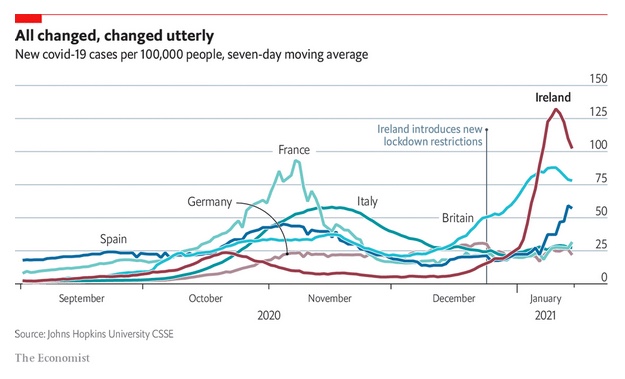Quote of the Day
”The point is that we are all capable of believing things which we know to be untrue, and then, when we are finally proved wrong, impudently twisting the facts so as to show that we were right. Intellectually, it is possible to carry on this process for an indefinite time: the only check on it is that sooner or later a false belief bumps up against solid reality, usually on a battlefield.”
- George Orwell
Musical alternative to the morning’s radio news
Liam O’Flynn & Mark Knopfler – An Droichead (the Bridge)
Long Read of the Day
Covid and me: 10 days on life support
Tim Hayward is a very good writer. He damn nearly died from Covid. More extraordinarily, he remembers enough of the experience to write this mesmerising article.
Pull up a chair, because you won’t want to look away until you’ve finished it.
And if you have any doubts about getting vaccinated, for God’s sake get real.
Now what?
From Venkatesh Rao in a long essay of his on Ribbonfarm:
So where does that leave us now, on the first day of the Permaweird, with Joe Biden, a blast from decades of neoliberal governance past, at the helm of world affairs, as veterans of the Clinton-Bush-Obama years stream back into the institutional rubble of Washington, DC, to “build back better”?
I don’t know.
Me neither. I have a sinking feeling that Joe Biden’s administration, for all the brave talk, is going to look a lot like the kind of government Hilary Clinton would have assembled had she won in 2016. And that’s really not good news.
An interesting paradox
On the one hand, Google is threatening to shut down search in Australia if the proposed digital news code goes ahead.
On the other hand, Google agrees to pay French news sites to send them traffic.
So what has France got? Answer: a state that won’t be bullied by a mere corporation. Google and Facebook are about to discover that the Australians are made of the same stuff. Couldn’t happen to a nastier crowd.
Inside Mar-a-Lago: the secret history of Trump’s Florida retreat | openDemocracy
Fine piece by Seth Thévoz …
As Donald Trump leaves office, the place that has come to symbolise Brand Trump is Mar-a-Lago – his 20-acre, 128-room private members’ club in Palm Beach, Florida. With much of the Trump business empire heavily indebted and losing money, Mar-a-Lago is one of its few genuine cash cows.
According to the Government Accountability Office, the US taxpayer has paid $1m a day for each of the days Trump has spent at Mar-a-Lago. “How much US taxpayers’ money was spent on ‘non-security improvements’ to Mar-a-Lago and Trump’s Bedminster [another private members’ club in New Jersey] residence?” the presidential historian Michael Beschloss recently asked, suggesting that the federal government could ask to be reimbursed, as it did with Richard Nixon’s California mansion after he left office.
Mar-a-Lago is what first made Trump ‘respectable’ in high society, and it has subsidised his lifestyle since well before he reached the presidency. All the while, as a private member’s club with hundreds of members and guests milling around during Trump’s visits, it has been cloaked in secrecy. ..
Not a club you’d want to belong to. But some of Trump’s neighbours are unhappy about the idea of him being there full-time.
Can Joe Biden make America great again?
I think you know the answer. But this terrific essay by Fintan O’Toole is the most insightful thing I’ve read about Biden to date. O’Toole’s argument is that what might give Biden the ability to weather what lies ahead is his personal experience of coping with tragedy.
This is how the piece begin…
Every year after 1975, Joe Biden, his second wife Jill, his sons Beau and Hunter and their growing families, would gather for Thanksgiving on Nantucket island off Cape Cod. Part of the annual ritual was that the Bidens would take a photograph of themselves in front of a quaint old house in the traditional New England style that stood above the dunes on their favourite beach.
In November 2014, when Biden was serving as Barack Obama’s vice-president, he found, where the house should have been, an empty space marked out by yellow police tape. The building, he wrote in his memoir Promise Me, Dad had “finally run out of safe ground and run out of time; it had been swept out into the Atlantic”.
O’Toole sees Biden as someone who views the world through the lens, not just of history, but of eternity — an impulse that comes with the territory of Biden’s Irish Catholicism, its fatalistic view of this earthly existence as, in the words of the rosary, a “valley of tears”. This is, as Biden sees it, “the Irishness of life”.
This rueful stoicism is, however, primarily shaped by intimate experience: the road crash that killed his first wife, Neilia, and their daughter, Naomi, in December 1972, shortly after Biden was elected to the Senate at the age of 29; Beau’s death from cancer in 2015. When he was a young senator, the journalistic in-joke was to refer to him as “Joe Biden (D-Del, TBPT)”. Those last four letters stood for “touched by personal tragedy”, a label that clung to him like a clammy mist of perpetual mourning.
The odd thing is that this tragic vision just might be what his country needs right now. Perhaps the way that the old house acts as both a political metaphor and a personal memory points to a confluence of the man and the moment. Perhaps the dark shadow of TBPT that walks beside the triumphantly ascendant Potus is not so much a ghost and more a guardian angel. Great piece. Read it through.
Another, hopefully interesting, link
- Dr. Martens boot prices have risen more than gold since 1960. Link
This blog is also available as a daily email. If you think this might suit you better, why not subscribe? One email a day, delivered to your inbox at 7am UK time. It’s free, and there’s a one-click unsubscribe if you decide that your inbox is full enough already!








